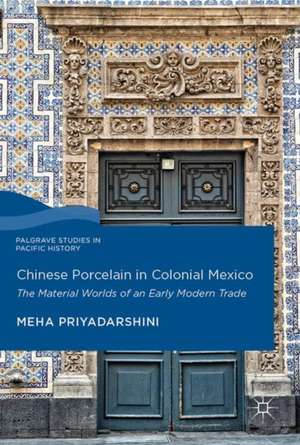Chinese Porcelain in Colonial Mexico: The Material Worlds of an Early Modern Trade: Palgrave Studies in Pacific History
Autor Meha Priyadarshinien Limba Engleză Hardback – 31 ian 2018
| Toate formatele și edițiile | Preț | Express |
|---|---|---|
| Paperback (1) | 691.26 lei 6-8 săpt. | |
| Springer International Publishing – 4 iun 2019 | 691.26 lei 6-8 săpt. | |
| Hardback (1) | 699.93 lei 6-8 săpt. | |
| Springer International Publishing – 31 ian 2018 | 699.93 lei 6-8 săpt. |
Preț: 699.93 lei
Preț vechi: 823.44 lei
-15% Nou
Puncte Express: 1050
Preț estimativ în valută:
133.93€ • 140.23$ • 111.09£
133.93€ • 140.23$ • 111.09£
Carte tipărită la comandă
Livrare economică 09-23 aprilie
Preluare comenzi: 021 569.72.76
Specificații
ISBN-13: 9783319665467
ISBN-10: 3319665464
Pagini: 198
Ilustrații: XVIII, 198 p. 30 illus., 25 illus. in color.
Dimensiuni: 148 x 210 x 18 mm
Greutate: 0.5 kg
Ediția:1st ed. 2018
Editura: Springer International Publishing
Colecția Palgrave Macmillan
Seria Palgrave Studies in Pacific History
Locul publicării:Cham, Switzerland
ISBN-10: 3319665464
Pagini: 198
Ilustrații: XVIII, 198 p. 30 illus., 25 illus. in color.
Dimensiuni: 148 x 210 x 18 mm
Greutate: 0.5 kg
Ediția:1st ed. 2018
Editura: Springer International Publishing
Colecția Palgrave Macmillan
Seria Palgrave Studies in Pacific History
Locul publicării:Cham, Switzerland
Cuprins
1 Introduction: A Global Commodity in the Transpacific Trade.- 2 Crafting a Global Brand: Jingdezhen in the Early Modern World.- 3 From Junk to Galleon: Commercial Activity in Manila.- 4 A Parián in the Plaza Mayor: Making Space for Asia in Colonial Mexico.- 5 Blue-and-White Chocolateros: Crafting a Local Aesthetic in a Colonial Context.- 6 Conclusion: Themes from a Connected World.-
Notă biografică
Meha Priyadarshini is Fellow at the Sciences Po Europe-Asia Programme in Le Havre, France. Her research and teaching interests include global history, material culture studies, colonial Latin American history and art history. She earned her PhD from Columbia University and has held fellowships at the Getty Research Institute, the European University Institute and the Kunsthistorisches Institut in Florence.
Textul de pe ultima copertă
This book follows Chinese porcelain through the commodity chain, from its production in China to trade with Spanish Merchants in Manila, and to its eventual adoption by colonial society in Mexico. As trade connections increased in the early modern period, porcelain became an immensely popular and global product. This study focuses on one of the most exported objects, the guan. It shows how this porcelain jar was produced, made accessible across vast distances and how designs were borrowed and transformed into new creations within different artistic cultures. While people had increased access to global markets and products, this book argues that this new connectivity could engender more local outlooks and even heightened isolation in some places. It looks beyond the guan to the broader context of transpacific trade during this period, highlighting the importance and impact of Asian commodities in Spanish America.
Caracteristici
Takes a local approach to a popular export product to explore the broader history of transpacific trade during the early modern period Offers detailed accounts of several different sites of production, trade and consumption, from China to the Philippines and on to Mexico Proposes a new perspective on the effect of increased connectivity between China and New Spain, charting both physical and demographic changes within cities and the isolation of other communities






